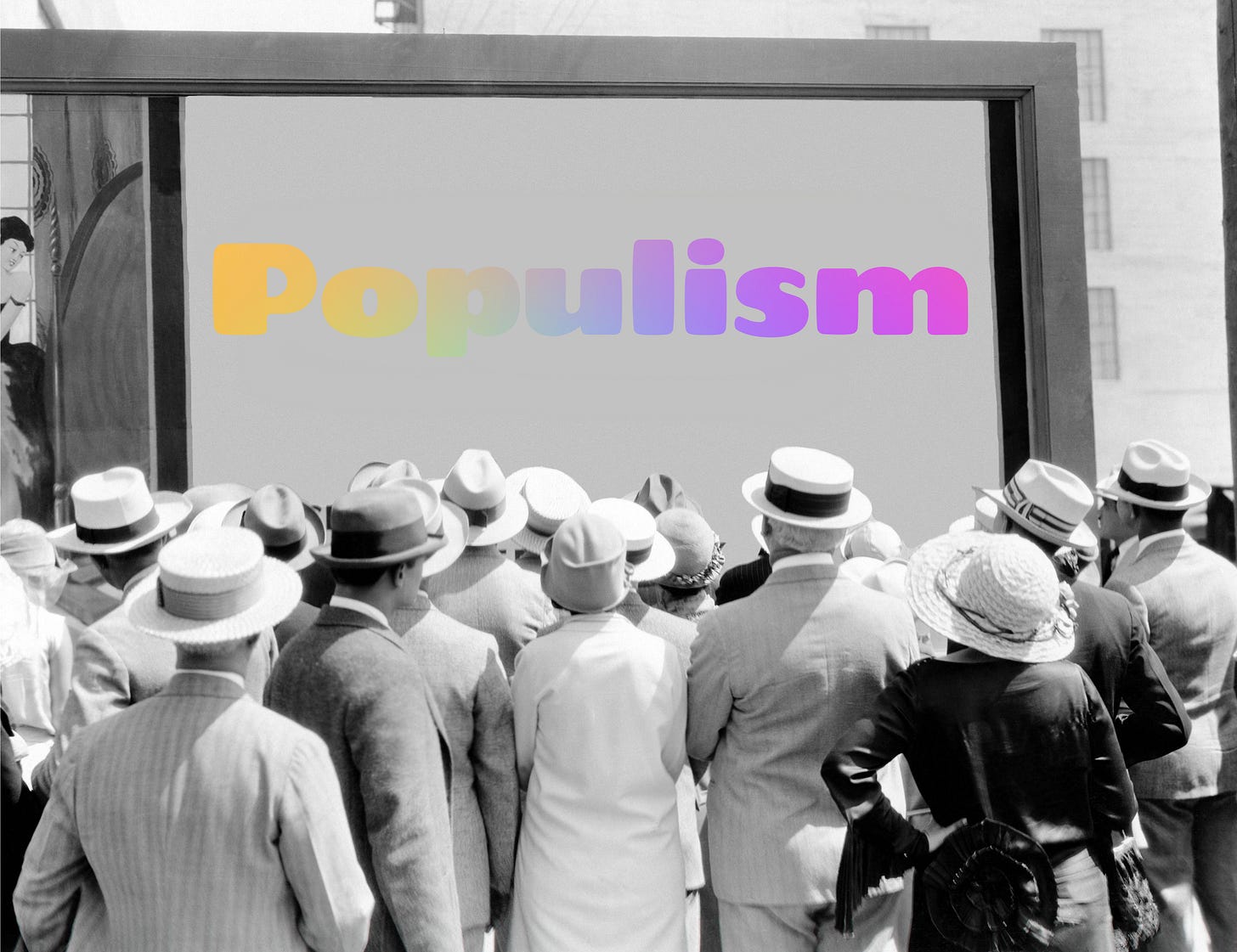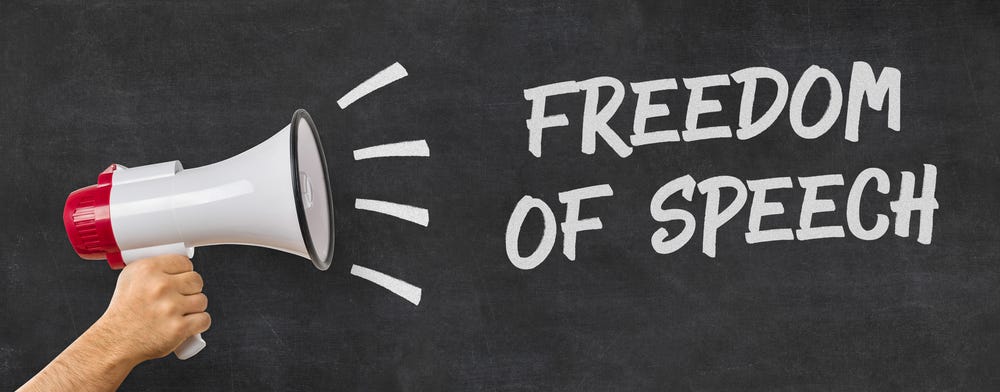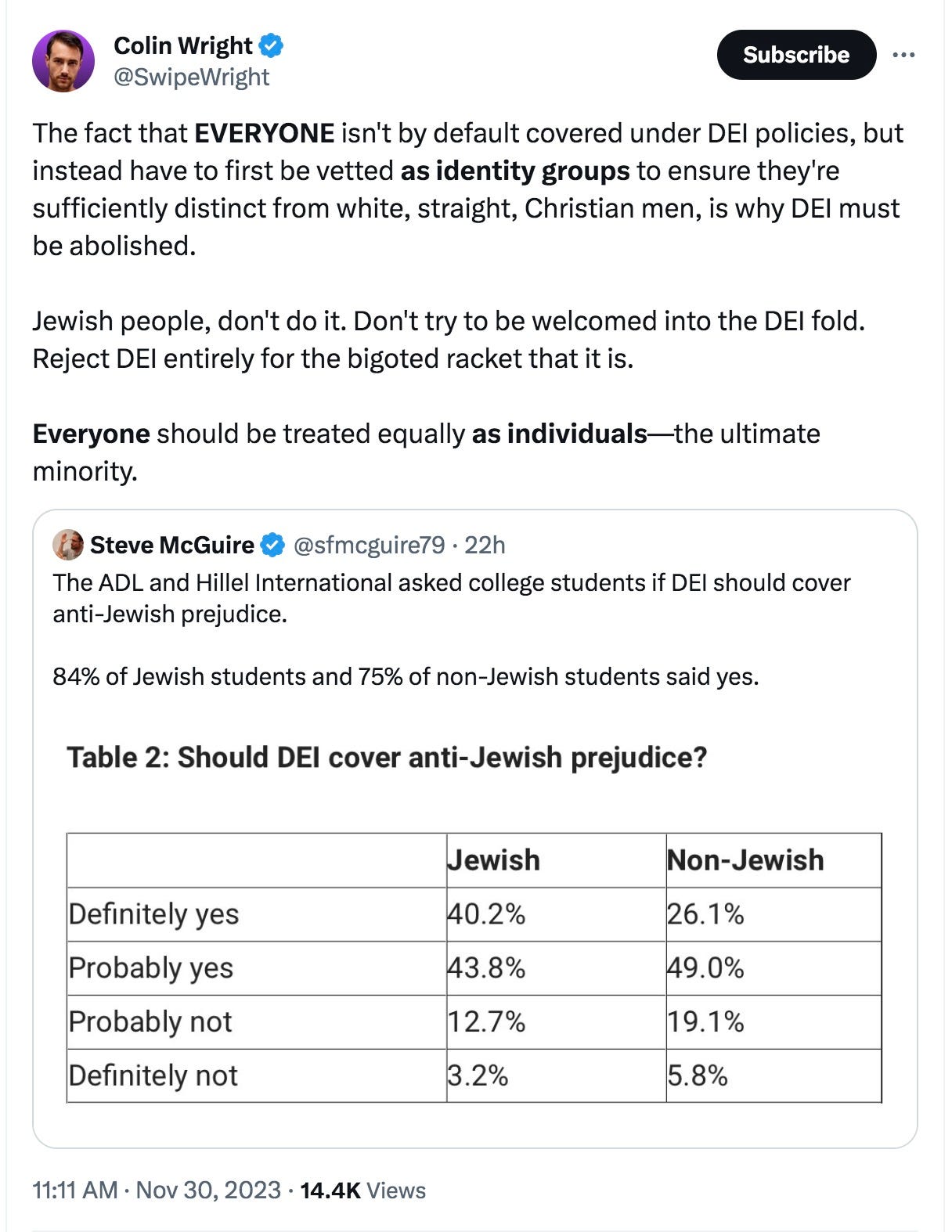E-Pluribus | November 30, 2023
The popularity of populism; it's OK to be nostalgic; and a global free speech declaration.
A round-up of the latest and best musings on the rise of illiberalism in the public discourse:
Michael Lind: Populism has become a gimmick
Is populism the latest, greatest threat to democracy, or just more of the same from politicians looking to get elected? Writing at UnHerd, Michael Lind says there’s a lot of sound and fury about populism, but in reality populism doesn’t have much to show for itself.
When populist candidates started to win national elections in the 2010s, panicked establishmentarians on both sides of the Atlantic warned that they could consolidate their power and destroy democracy. On both counts, these misgivings were misplaced. From Donald Trump to Boris Johnson, contemporary populists have proved incapable of consolidating power or exercising it effectively. And far from being incompatible with democracy, they owe their success to today’s version of democracy, in which protest votes are becoming ritualised. As opposed to being a harbinger of a new fascism, populism is now just another political style, detached from any substantive politics and incapable of radical reform.
[. . .]
Further evidence that populism has become a gimmick, rather than a serious programme, comes from the record of populists in office. Silvio Berlusconi, the original Right-wing populist, a plutocrat and media celebrity before Trump, was prime minister in four Italian governments. Despite all the commotion, it is hard to see what, if anything, changed as a result. Under Georgia Meloni, Italy’s hard-Right has reconciled itself to the EU and softened its tone. In the UK, Johnson came and went, securing Brexit but otherwise leaving no trace on public policy. And like a bad-tempered, orange-haired Cheshire Cat, Trump in his first term left nothing but a scowl.
Populist voters in all Western democracies, whatever their other differences, want current high levels of immigration to be reduced. Trump made this central to his campaign in 2016, and it was inextricably wrapped up with Brexit under Johnson. But once in office, Trump betrayed his voters by refusing to press for the only effective way to reduce demand for immigration — requiring American employers to certify that their workers are all US citizens or legal immigrants. Instead, Trump avoided clashing with the business wing of the Republican Party, which is keen on cheap illegal immigrant labour, and diverted attention to a “big, beautiful wall” along the US-Mexican border which his own party failed to fund.
[. . .]
The problem here is structural: the very feature of modern Western democracies that creates the demand for populist politicians also ensures their failure. In the north Atlantic, this structure has been transformed in the last generation by two phenomena. The first is the transfer of decision-making power away from democratically elected legislatures and executives to entities that are highly insulated from election results: national and transnational judiciaries, central banks, international institutions, and corporations such as the social media giants that function as de facto public utilities but with no democratic oversight or control. The second is the disintegration of political parties as mass membership organisations, in which ordinary citizens in local chapters can participate and exert influence outside of elections.
Read it all.
James Lileks: What Are We Nostalgic For?
While trying to live in the past is never a good idea, having an appreciation for it is reasonable and normal. James Lileks writes at Discourse Magazine that one mustn’t approve of everything in the past or wish for a full scale turning back of the clock to find pleasure in the best of previous eras. (Note: It’s hard to get a good sense of the essay from excerpts - read the whole thing.)
Nevertheless, the ice cube tray triggers nostalgia. Why? Not because it’s better. It’s worse in every way. It just brings back a set of memories from when you were small and happy and generally clueless, and it was a hot day and mom made Kool-Aid. That’s it. But that’s enough to make you pick one up at a garage sale and think about it for a few seconds, and smile: I remember this.
It’s possible we smile at the ice cube tray because it confirms our opinion of the Golden Past: Everything was a little more difficult, but we were better for it. Instant, infinite ice is decadent and has made us soft—we’ve come to expect perfect ice at the literal touch of a button, with no effort on our part. Our phones connect us instantly to the other side of the world for pennies, but oh, in the old days when you dialed a number, you really dialed a number, and the heft of the receiver had a significant solidity that made the phone call seem more important. Why, you could knock someone unconscious with an old receiver. Try that with your iPhone.
Our cars alert us when we stray out of our lane and gently guide us back between the lines. They pull music from satellites in space. But those sheet-metal boats of the ’50s, those were better. Our TVs are big and bright and sharp, but we sigh when we see the space-age design of a Philco Predicta or the bourgeois stolidity of a console set with the record player built in.
[. . .]
I think these things are all rather silly, but they’re understandable. There’s wisdom in these sentiments. And a danger.
[. . .]
. . .It’s good to be interested in other eras, how they looked, why things looked the way they did, what it all meant. (Really, it meant they wanted to sell you soap and watch Milton Berle.) What’s not healthy is imposing some narrative of uniform cultural solidity on the past based on memories and YouTube compilations of old commercials. Boohooing about the loss of a common culture—three networks, Time and Newsweek and Life, the daily paper, the movies, Paul Harvey every noon saluting his fellow Americans—saps one’s desire to make something good of our times and the times to come, because what’s the point?
[. . .]
There was so much that was better, and it’d be foolish not to want to spend time studying the particulars of the American past. The way people seemed to dress and act like adults, the pre-burb vitality of downtowns, the shared culture that made up the unique American atmosphere inhaled by all—for all the bad press the 20th century gets, we really did build something remarkable. Now we can’t put on a great hopeful world’s fair, build a railway, sell a hundred thousand copies of a newspaper crammed with stories and ads big and small for everything from furniture and shoes to lumbago cures and milk. We’ve lost the plot; we’ve lost the knack, and we all know it on one level or another.
And it makes you mad. At some level, nostalgia makes you mad.
Compounding the problem is the Year Zero utopianism of the modern Left, which regards the past as a vast abattoir of perfidious “-isms.” Praise a cathedral on X-Twitter, and they’ll bring up ephebophiliac priests. Laud the style of a 19th century English gentleman, and you’ll hear the litany of colonial injustices. The Left suspects anyone who admires the works of a previous era because they must be secret Klansmen who are using the superiority of Bernini over modern sculpture to make a case against the entirety of modernity. Oh, you may say they prefer the architecture of St. Peter’s over a 1960s football stadium, but what you really mean is women shouldn’t work and gays should live in the shadows.
Yeah, that’s it, pal. Nailed it. When I say that Moderne skyscrapers of the ’20s and ’30s were, on the whole, superior to endless iterations of Miesian boxes, it’s an Ayn Rand-ian, fascist dog whistle.
Read it all here.
Matthew Xiao: Renowned scholars sign declaration launching global free speech movement
An eclectic group of thinkers committed to free expression has released the Westminster Declaration, reports Matthew Xiao at The College Fix. Many of the signatories on this call to “defeat the encroaching forces of censorship” will be familiar to Pluribus readers.
Among the signatories are prominent scholars such as psychologists Jordan Peterson and Steven Pinker, biologists Richard Dawkins and Bret Weinstein, economist Jeffrey Sachs, linguist John McWhorter, and medical professors Martin Kulldorf and Jay Bhattacharya.
The scholars have faced cancel culture campaigns for voicing narratives that go against popular progressive opinions on campuses on topics such as intellectual diversity, race and COVID-19.
The declaration is also signed by prominent journalists who have been censored or canceled, such as Bari Weiss, Glenn Greenwald and Matt Taibbi.
“We recognize that words can sometimes cause offense, but we reject the idea that hurt feelings and discomfort, even if acute, are grounds for censorship,” it states. “Open discourse is the central pillar of a free society, and is essential for holding governments accountable, empowering vulnerable groups, and reducing the risk of tyranny.”
Freedom of speech “is a vital ‘first liberty’ from which all other liberties follow,” the declaration states. “It is only through free speech that we can denounce violations of our rights and fight for new freedoms.”
Read the whole thing.
Around Twitter (X)
Here’s Free Black Thought with some resources on Diversity, Equity, and Inclusion (DEI):
Colin Wright, with an assist from Barbara Kay, on the inherent discriminatory nature of DEI:
Finally, watch journalist Rupa Subramanya testifying before Congress about coming threats to freedom, and the threats already here: “Of course, I’m not a real time traveler. I just live in Canada.” (click for video)










